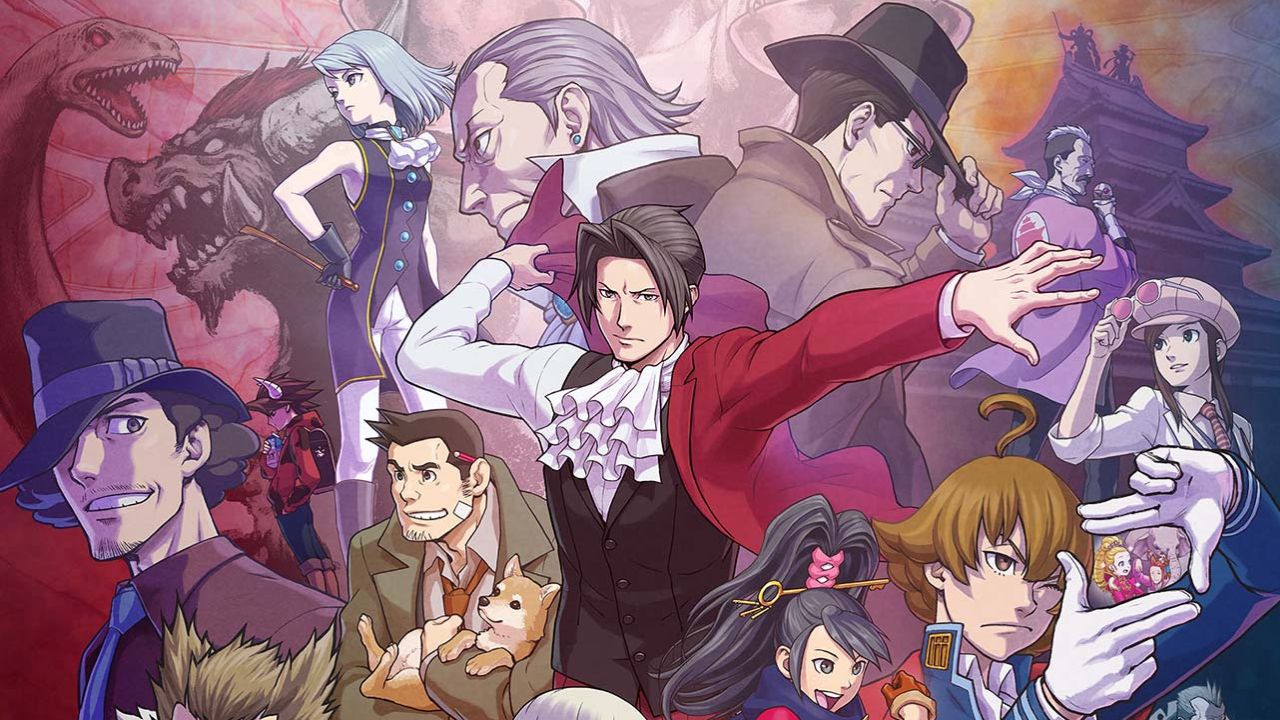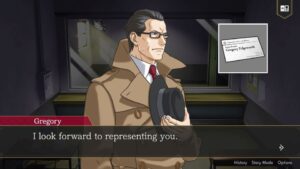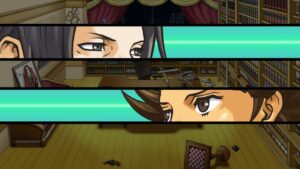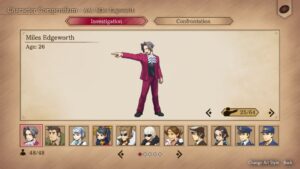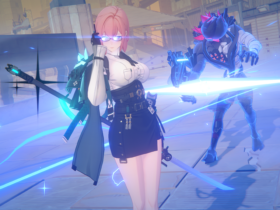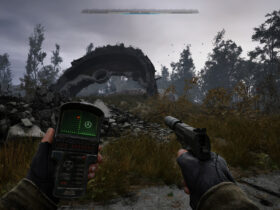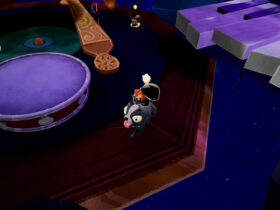The value of game Collections and re-releases of relatively older titles is often questioned. It’s sadly true that publishers often just make easy cash by appealing to nostalgic fans looking for simple ways to relive their youthful memories. However, some anthologies turn out to be virtuous in honouring the glorious past of their parent companies, offering bonuses that go beyond simple galleries. From this perspective, Capcom is setting a standard, as evidenced by the treatment given to the franchise of Ace Attorney, which has literally seen no new titles since 2017 yet remains vibrant thanks to its passionate and loyal fandom. Lately, several anthology collections dedicated to the saga have been released, and the Ace Attorney Investigations Collection (coming out on September 6 for Nintendo Switch, PlayStation 4, Steam, and Xbox One) is truly the icing on the cake.
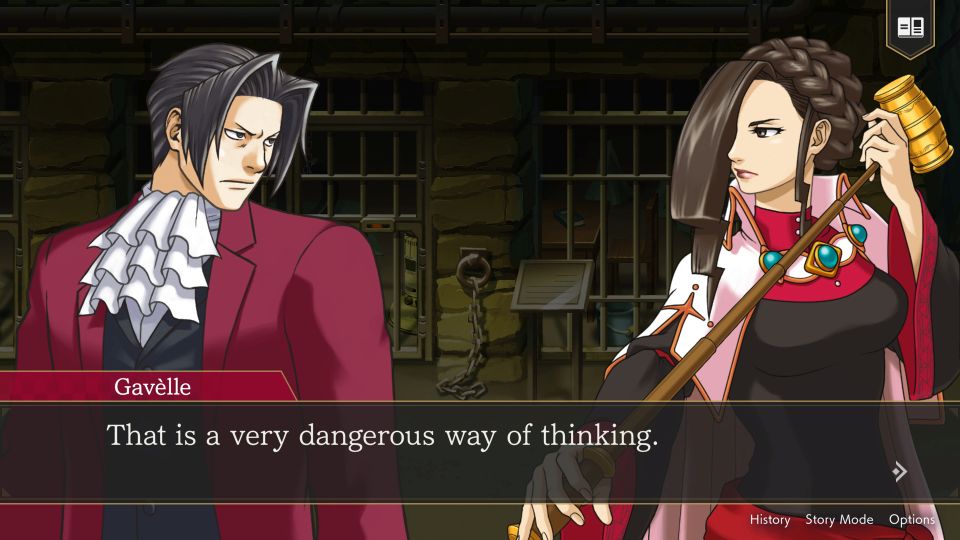
Ace Attorney Investigations Collection: searching for the truth
A “definitive” collection of the first three, iconic chapters of Gyakuten Saiban/Ace Attorney was indeed expected and due. However, this wasn’t the case for the later chapters, as they required significant adaptation efforts on various fronts. Capcom has skilfully pursued this task, first with the miraculous prequel duology included in The Great Ace Attorney Chronicles and then, more recently, with the Apollo Justice: Ace Attorney Trilogy, which made the three “concluding” chapters of the saga current and accessible.
At this point, the unknown was the two spin-off games “outside” the courtroom, but not lacking in quirky characters, clues to find, and contradictions to unveil—specifically, the two Investigations games featuring Miles Edgeworth, a shrewd, distinguished district attorney who is also involuntarily amusing in his confidence. Beloved by all fans of the franchise, he is the perfect hero for realizing the vision of an Ace Attorney who leaves aside the “Perry Mason” aspects to focus on the “Columbo” elements, fully succeeding in this aim. However, at the time of their release, the two Investigations games did not manage to rank among the fans’ favourites, to the point that the second instalment never left Asian shores until now. In the end, though, Capcom decided to win back its loyal audience by creating this highly sought-after new anthology.
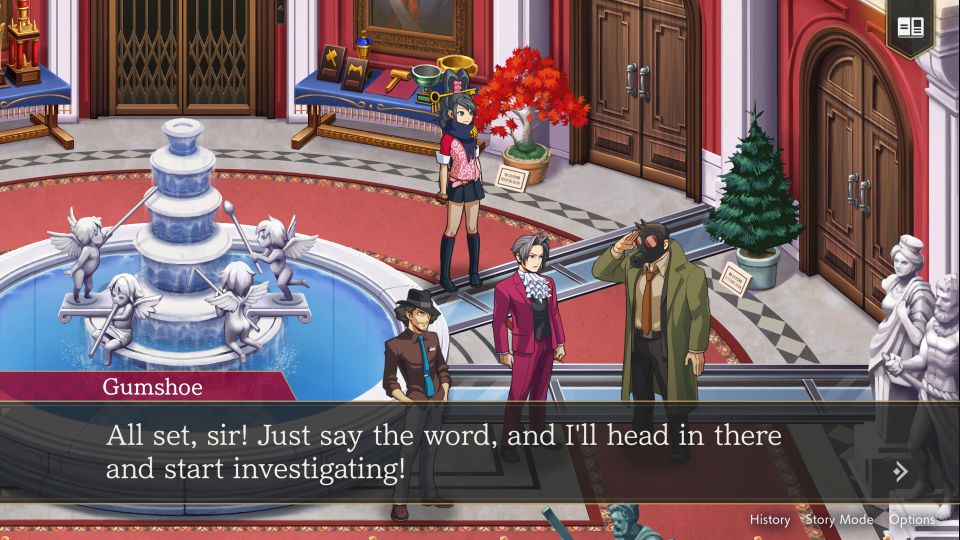
At the crime scene
Let’s take a step back for of those unfamiliar with the saga: Gyakuten Saiban is a series of investigative visual novels that have shaped a genre of their own, inspiring various epigones that can only replicate its unique structure.
Straddling the line between legal thriller and courtroom drama, the player takes on the role of a lawyer searching for answers, navigating crime scenes, investigation locations, and courtrooms. In the main saga, players embody an unlikely defence attorney and are called to investigate, interrogate witnesses, search for clues, unmask false testimonies, and essentially overturn trials that seem to have already predetermined outcomes. The saga excels at staging and blending drama with absurdist comedy, bringing beloved characters and impactful situations to life that keep players glued to the screen. This is done despite relatively simple gameplay solutions tied to basic elements of Japanese visual novels and point-and-click adventures.
In the two Investigations chapters, the courtroom drama aspects are diminished to enhance the investigative side instead. A brutal crime has been committed, and the protagonist—sometimes assisted awkwardly yet valuably by their assistant—investigates, finds clues, builds theories, dismantles false testimonies, and ultimately traps the culprits.
The gameplay is divided into designated phases that progress as investigations unfold, effectively. However, these phases feel less defined compared to those in the original saga, transitioning more fluidly between investigations, dialogues, and testimonies without the courtroom’s intense atmosphere looming over them. Some dynamics remain the same, albeit with different names and mechanics. For example, instead of courtroom cross-examinations, we have intense discussions with witnesses, but the results and penalties are similar. There are also special mechanics, less “fantastical” than those used by Phoenix Wright and Apollo Justice in other titles, and more akin to mind games à la Sherlock: we can mention, without diving into detail, the “mental chess” technique present in the second game, for example. The investigations are multifaceted, allowing the character to roam the scene (not just our cursor, as per tradition) and examine various elements differently, scrutinizing objects, crime scenes, and various details, comparing them with items in the inventory, and seeking opinions from other characters. This all employs the logic and deduction skills of our justice champion, occasionally aided by their assistants. The unusual presence of the young Faye and her gadget, the Little Thief, capable of reconstructing the scenarios of crime scenes, is crucial in this regard.

In short, if you enjoy investigative games on rails, you are in the right place. Although, of course, the cases, characters, and overall setting should be approached with the right mindset and a willingness to engage with the game. The game was conceived by the eclectic mind of Shu Takumi, which embraces a certain level of anime quirkiness and typically Japanese weirdness.
The gameplay of the title, in fact, is anchored in rather outdated tropes, and basically consists of using a minimum of cleverness to connect the various dots utilizing the interfaces available to us: the gameplay itself isn’t all that entertaining, but the situations in which the characters find themselves—and the characters themselves—compel players to relentlessly press witnesses to discover what will happen next. One must certainly come to terms with the visual novel nature of it all, as evidenced by the fact that there is even an option for “autoplay” that allows you to enjoy everything as if it were an anime: all narrative choices and plot twists (which always ultimately lead to one solution) will be played by the CPU instead of you, making you mere spectators. However, we recommend against this option because, ultimately, if you get “stuck” somewhere, just trial and error will lead you to satisfaction in hitting the right notes on the first try.
In this dual, as we mentioned, the protagonist is the prosecutor Miles Edgeworth, a clever and incorruptible man of law with a troubled past. After some courtroom ups and downs with rival Phoenix Wright, he is more determined than ever to uncover every shred of truth in the cases presented to him… or those he finds himself in against his will. His very office, in fact, becomes the scene of a brutal yet inexplicable crime, and his deductive abilities are itching to solve the case, which is just the springboard into a much larger pool of sharks. Helping him are old and new acquaintances in a mystery that will deepen and branch off in new directions. The stakes will get even higher in the second instalment of the series, where Miles must confront the past… and what he desires for his future.
As for these new versions of the games, firstly, we must highlight the excellent work done in translating and adapting the second game. In line with the original adaptation of the series (therefore with American names and references rather than Japanese ones) that do not betray the essence of the original. The translation of the first game (in English) appears identical to the past but features new voice acting for key phrases, and you can play in seven different languages (though unfortunately, Italian and Spanish are not included at this time despite heated requests from Italian and Spanish fans).
Numerous quality-of-life adjustments have been made to the experience (which, let’s remember, originally dates back to the days of the Nintendo DS), echoing and expanding on what was already done in the previous compilation. In addition to the already highly regarded galleries of artwork, videos, and music, trophies, and newly released content in the West, we have the option to choose directly from which episode and chapter to start playing (although it would be—quite literally—criminal not to play in sequential order at least the first time), and the aforementioned option to select Story Mode and enjoy everything as if it were some sort of anime, should you wish to take a break from mental gymnastics and just savour the narrative part. Additionally, one can conveniently re-read the story logs and switch up the background music.
The element that most distinctly sets this anthology apart from previous ones is the graphics: while previous collections underwent an excellent remastering process in super HD, here we are faced with a true remake, with HD sprites redrawn by the historic designer Tatsuro Iwamoto. The quality of the models is impressive in terms of definition and expressiveness of the animations, although one must adapt to the chibi style employed, meaning heads are slightly exaggerated proportionally the body. Nonetheless, it’s always possible to play with the classic version featuring simply “cleaned-up” original sprites.
Ace Attorney Investigations Collection is an unmissable gem for any fan, the missing piece of the puzzle that also fills a narrative gap related to the character of Edgeworth that fans in the West can now also bridge. Furthermore, while the first game might feel a bit “rigid” in its components, the second plays its cards much better and is enjoyable in every respect, with a truly gripping plot.
Newcomers should perhaps play the original trilogy first to fully appreciate all the nuances of the plot and characters before returning here, but there’s no narrative or gameplay barrier to trying the Investigations saga first. And in any case, it’s still a great thing to be able to recover a title like this at the peak of its potential. At this point, let’s hope not only for a re-release of the crossover with Professor Layton but also for a modern true sequel to the saga.


